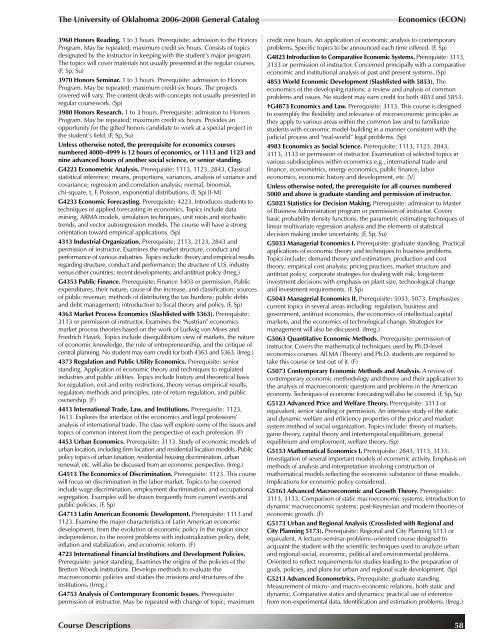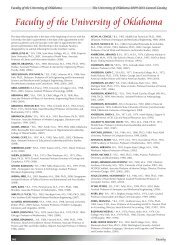ART - Catalog - University of Oklahoma
ART - Catalog - University of Oklahoma
ART - Catalog - University of Oklahoma
Create successful ePaper yourself
Turn your PDF publications into a flip-book with our unique Google optimized e-Paper software.
The Uni ver sity <strong>of</strong> <strong>Oklahoma</strong> 2006-2008 Gen eral Cat a log<br />
Economics (ECON)<br />
3960 Honors Reading. 1 to 3 hours. Prerequisite: admission to the Honors<br />
Program. May be repeated; maximum credit six hours. Consists <strong>of</strong> topics<br />
designated by the instructor in keeping with the student’s major program.<br />
The topics will cover materials not usually presented in the regular courses.<br />
(F, Sp, Su)<br />
3970 Honors Seminar. 1 to 3 hours. Prerequisite: admission to Honors<br />
Program. May be repeated; maximum credit six hours. The projects<br />
covered will vary. The content deals with concepts not usually presented in<br />
regular coursework. (Sp)<br />
3980 Honors Research. 1 to 3 hours. Prerequisite: admission to Honors<br />
Program. May be repeated; maximum credit six hours. Provides an<br />
opportunity for the gifted honors candidate to work at a special project in<br />
the student’s field. (F, Sp, Su)<br />
Unless otherwise noted, the prerequisite for economics courses<br />
numbered 4000–4999 is 12 hours <strong>of</strong> economics, or 1113 and 1123 and<br />
nine advanced hours <strong>of</strong> another social science, or senior standing.<br />
G4223 Econometric Analysis. Prerequisite: 1113, 1123, 2843. Classical<br />
statistical inference; means, proportions, variances, analysis <strong>of</strong> variance and<br />
covariance; regression and correlation analysis; normal, binomial,<br />
chi-square, t, F, Poisson, exponential distributions. (F, Sp) [I-M]<br />
G4233 Economic Forecasting. Prerequisite: 4223. Introduces students to<br />
techniques <strong>of</strong> applied forecasting in economics. Topics include data<br />
mining, ARMA models, simulation techniques, unit roots and stochastic<br />
trends, and vector autoregression models. The course will have a strong<br />
orientation toward empirical applications. (Sp)<br />
4313 Industrial Organization. Prerequisite: 2113, 2123, 2843 and<br />
permission <strong>of</strong> instructor. Examines the market structure, conduct and<br />
performance <strong>of</strong> various industries. Topics include: theory and empirical results<br />
regarding structure, conduct and performance; the structure <strong>of</strong> U.S. industry<br />
versus other countries; recent developments; and antitrust policy. (Irreg.)<br />
G4353 Public Finance. Prerequisite: Finance 3403 or permission. Public<br />
expenditures, their nature, cause <strong>of</strong> the increase, and classification; sources<br />
<strong>of</strong> public revenue; methods <strong>of</strong> distributing the tax burdens; public debts<br />
and debt management; introduction to fiscal theory and policy. (F, Sp)<br />
4363 Market Process Economics (Slashlisted with 5363). Prerequisite:<br />
3113 or permission <strong>of</strong> instructor. Examines the “Austrian” economics<br />
market process theories based on the work <strong>of</strong> Ludwig von Mises and<br />
Friedrich Hayek. Topics include disequilibrium view <strong>of</strong> markets, the nature<br />
<strong>of</strong> economic knowledge, the role <strong>of</strong> entrepreneurship, and the critique <strong>of</strong><br />
central planning. No student may earn credit for both 4363 and 5363. (Irreg.)<br />
4373 Regulation and Public Utility Economics. Prerequisite: senior<br />
standing. Application <strong>of</strong> economic theory and techniques to regulated<br />
industries and public utilities. Topics include history and theoretical basis<br />
for regulation, exit and entry restrictions, theory versus empirical results,<br />
regulatory methods and principles, rate <strong>of</strong> return regulation, and public<br />
ownership. (F)<br />
4413 International Trade, Law, and Institutions. Prerequisite: 1123,<br />
3613. Explores the interface <strong>of</strong> the economics and legal pr<strong>of</strong>essions’<br />
analysis <strong>of</strong> international trade. The class will explore some <strong>of</strong> the issues and<br />
topics <strong>of</strong> common interest from the perspective <strong>of</strong> each pr<strong>of</strong>ession. (F)<br />
4453 Urban Economics. Prerequisite: 3113. Study <strong>of</strong> economic models <strong>of</strong><br />
urban location, including firm location and residential location models. Public<br />
policy topics <strong>of</strong> urban taxation, residential housing discrimination, urban<br />
renewal, etc. will also be discussed from an economic perspective. (Irreg.)<br />
G4513 The Economics <strong>of</strong> Discrimination. Prerequisite: 1123. This course<br />
will focus on discrimination in the labor market. Topics to be covered<br />
include wage discrimination, employment discrimination, and occupational<br />
segregation. Examples will be drawn frequently from current events and<br />
public policies. (F, Sp)<br />
G4713 Latin American Economic Development. Prerequisite: 1113 and<br />
1123. Examine the major characteristics <strong>of</strong> Latin American economic<br />
development, from the evolution <strong>of</strong> economic policy in the region since<br />
independence, to the recent problems with industrialization policy, debt,<br />
inflation and stabilization, and economic reform. (F)<br />
4723 International Financial Institutions and Development Policies.<br />
Prerequisite: junior standing. Examines the origins <strong>of</strong> the policies <strong>of</strong> the<br />
Bretton Woods institutions. Develops methods to evaluate the<br />
macroeconomic policies and studies the missions and structures <strong>of</strong> the<br />
institutions. (Irreg.)<br />
G4753 Analysis <strong>of</strong> Contemporary Economic Issues. Prerequisite:<br />
permission <strong>of</strong> instructor. May be repeated with change <strong>of</strong> topic; maximum<br />
credit nine hours. An application <strong>of</strong> economic analysis to contemporary<br />
problems. Specific topics to be announced each time <strong>of</strong>fered. (F, Sp)<br />
G4823 Introduction to Comparative Economic Systems. Prerequisite: 3113,<br />
3133 or permission <strong>of</strong> instructor. Concerned principally with a comparative<br />
economic and institutional analysis <strong>of</strong> past and present systems. (Sp)<br />
4853 World Economic Development (Slashlisted with 5853). The<br />
economics <strong>of</strong> the developing nations; a review and analysis <strong>of</strong> common<br />
problems and issues. No student may earn credit for both 4853 and 5853.<br />
†G4873 Economics and Law. Prerequisite: 3113. This course is designed<br />
to exemplify the flexibility and relevance <strong>of</strong> microeconomic principles as<br />
they apply to various areas within the common law and to familiarize<br />
students with economic model-building in a manner consistent with the<br />
judicial process and “real-world” legal problems. (Sp)<br />
4983 Economics as Social Science. Prerequisite: 1113, 1123, 2843,<br />
3113, 3133 or permission <strong>of</strong> instructor. Examination <strong>of</strong> selected topics in<br />
various subdisciplines within economics e.g., international trade and<br />
finance, econometrics, energy economics, public finance, labor<br />
economics, economic history and development, etc. [V]<br />
Unless otherwise noted, the prerequisite for all courses numbered<br />
5000 and above is graduate standing and permission <strong>of</strong> instructor.<br />
G5023 Statistics for Decision Making. Prerequisite: admission to Master<br />
<strong>of</strong> Business Administration program or permission <strong>of</strong> instructor. Covers<br />
basic probability density functions, the parametric estimating techniques <strong>of</strong><br />
linear multivariate regression analysis and the elements <strong>of</strong> statistical<br />
decision making under uncertainty. (F, Sp, Su)<br />
G5033 Managerial Economics I. Prerequisite: graduate standing. Practical<br />
applications <strong>of</strong> economic theory and techniques to business problems.<br />
Topics include: demand theory and estimation; production and cost<br />
theory; empirical cost analysis; pricing practices, market structure and<br />
antitrust policy; corporate strategies for dealing with risk; long-term<br />
investment decisions with emphasis on plant size, technological change<br />
and investment requirements. (F, Sp)<br />
G5043 Managerial Economics II. Prerequisite: 5033, 5073. Emphasizes<br />
current topics in several areas including: regulation, business and<br />
government, antitrust economics, the economics <strong>of</strong> intellectual capital<br />
markets, and the economics <strong>of</strong> technological change. Strategies for<br />
management will also be discussed. (Irreg.)<br />
G5063 Quantitative Economic Methods. Prerequisite: permission <strong>of</strong><br />
instructor. Covers the mathematical techniques used by Ph.D-level<br />
economics courses. All MA (Theory) and Ph.D. students are required to<br />
take this course or test out <strong>of</strong> it. (F)<br />
G5073 Contemporary Economic Methods and Analysis. A review <strong>of</strong><br />
contemporary economic methodology and theory and their application to<br />
the analysis <strong>of</strong> macroeconomic questions and problems in the American<br />
economy. Techniques <strong>of</strong> economic forecasting will also be covered. (F, Sp, Su)<br />
G5123 Advanced Price and Welfare Theory. Prerequisite: 3113 or<br />
equivalent, senior standing or permission. An intensive study <strong>of</strong> the static<br />
and dynamic welfare and efficiency properties <strong>of</strong> the price and market<br />
system method <strong>of</strong> social organization. Topics include: theory <strong>of</strong> markets,<br />
game theory, capital theory and intertemporal equilibrium, general<br />
equilibrium and employment, welfare theory. (Sp)<br />
G5153 Mathematical Economics I. Prerequisite: 2843, 3113, 3133.<br />
Investigation <strong>of</strong> several important models <strong>of</strong> economic activity. Emphasis on<br />
methods <strong>of</strong> analysis and interpretation involving construction <strong>of</strong><br />
mathematical models reflecting the economic substance <strong>of</strong> these models.<br />
Implications for economic policy considered.<br />
G5163 Advanced Macroeconomic and Growth Theory. Prerequisite:<br />
3113, 3133. Comparison <strong>of</strong> static macroeconomic systems; introduction to<br />
dynamic macroeconomic systems; post-Keynesian and modern theories <strong>of</strong><br />
economic growth. (F)<br />
G5173 Urban and Regional Analysis (Crosslisted with Regional and<br />
City Planning 5173). Prerequisite: Regional and City Planning 5113 or<br />
equivalent. A lecture-seminar-problems-oriented course designed to<br />
acquaint the student with the scientific techniques used to analyze urban<br />
and regional social, economic, political and environmental problems.<br />
Oriented to reflect requirements for studies leading to the preparation <strong>of</strong><br />
goals, policies, and plans for urban and regional scale development. (Sp)<br />
G5213 Advanced Econometrics. Prerequisite: graduate standing.<br />
Measurement <strong>of</strong> micro- and macro-economic relations, both static and<br />
dynamic. Comparative statics and dynamics; practical use <strong>of</strong> inference<br />
from non-experimental data. Identification and estimation problems. (Irreg.)<br />
Course Descriptions 58








